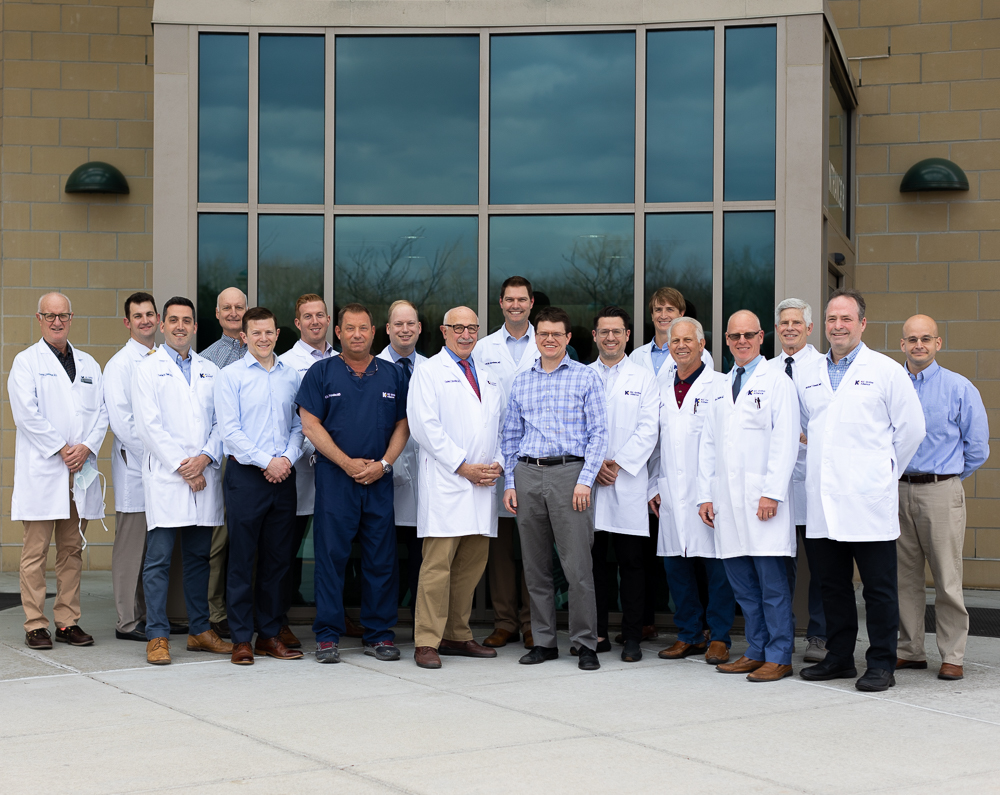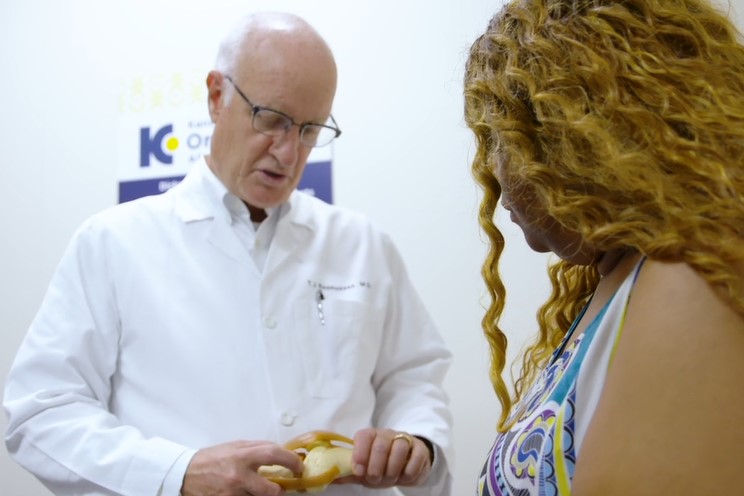
If you’re considering major surgery, finding a surgeon to safely and effectively perform your procedure is crucial. However, it can be difficult to know what to look for when selecting an orthopedic provider.
Kansas City Orthopedic Alliance is the Midwest’s premier provider of orthopedic care. As the largest orthopedic practice in Kansas City, we perform the highest number of joint replacements in the area. Our 5 convenient locations—Overland Park, Leawood, Belton, Kansas City, and Blue Springs—make it easy to find the best hip replacement surgeon.
In Kansas City, many surgeons perform a variety of procedures. But just because a surgeon has the right letters after their name, that doesn’t mean they are the right fit for your needs.
So, let’s discuss everything you should consider when looking for the best hip replacement surgeon in Kansas City. By the end of this blog, you’ll have the tools to make a well-informed decision about your surgery.
Credentials, Qualifications, and Experience
When researching the best hip replacement surgeons in Kansas City, you must ensure they are qualified to perform your specific procedure. Consider the following:
1. Look at their credentials
The first credential to look for in a surgeon (besides a state medical license—the bare minimum to practice medicine) is board certification from the American Board of Orthopaedic Surgery (ABOS).
Surgeons can receive this certification after completing at least 5 years of residency training and passing rigorous ABOS examinations. To maintain this certification, surgeons must stay up-to-date on the latest procedures and techniques.
Not all surgeons are board certified, but as orthopedic specialists, we always recommend patients look for surgeons with this certification. To determine if a surgeon is board certified, you can check their accreditation through the ABOS.
At KCOA, all of our surgeons are board certified or completing the certification process. As a result, you can feel confident knowing that your KCOA provider has the expertise to perform your procedure.
2. Consider their qualifications
Some surgeons complete fellowships in specialty areas, such as total joint replacement or sports medicine. After completing their residency, these surgeons undergo an additional 1 to 2 years of specialized training. As a result, these providers have advanced knowledge in diagnosing and treating musculoskeletal injuries.
KCOA is proud to have many fellowship-trained physicians on our team.
3. Ask about their experience
You need a surgeon with extensive experience performing hip replacements. It’s important to look not only at their total years in practice, but also at the scope of their experience and how frequently they perform surgery.
For example, you could find two surgeons online that advertise experience with hip replacement. However, one surgeon has been practicing for 20 years, and the other surgeon has been in practice for 5 years. So, who should you choose to perform your procedure?
A surgeon with 20 years of experience is not automatically the best option. For example, that surgeon could be a shoulder specialist who has only performed a few hip replacements. On the other hand, the surgeon with 5 years of experience might be performing multiple hip replacements a week.
KCOA makes it easy to research provider qualifications, fellowships, and experience. If you are looking for a board-certified surgeon with specific knowledge and expertise in hip replacements, take a look at the following providers in Kansas City:
- Dr. Scott Abraham
- Dr. David Clymer
- Dr. Scott Cook
- Dr. Danny Gurba
- Dr. Daniel Reinhard
- Dr. Nicholas Ting
- Dr. Scott Wingerter
If you have any questions or want to learn more about joint replacement surgery in KC, contact KCOA and we will be happy to help!

Finding the right fit
While qualifications and experience are extremely important when choosing a surgeon, there’s more to consider than the qualifications someone has on paper. You need to find a surgeon who is the right fit—someone you can trust, who takes the time to listen to your concerns, and who genuinely cares for your health and well-being.
We recommend the following steps to find a surgeon who is the right fit for you:
1. Know the difference between a hospital and a private practice
When choosing a surgeon, you want to consider if they are based in a hospital or at a private practice. The patient experience at these locations can differ drastically.
KCOA believes that customized care is the biggest strength of the private practice model. As a private practice, we take an individualized and personalized approach to every patient. We have the time to care for you, get to know you, and answer any questions you have along the way.
On the other hand, it can be easy to get lost in the system at a large hospital. Patients often tell us that communication is very frustrating and can feel impersonal.
Another strength of the private practice model is that you have options for your care. KCOA has surgeons who specialize in specific procedures and are among the best at what they do—and you can choose from any of them.
2. Ask friends and family for referrals
Word of mouth can be a great way to find providers in your area. If you have friends or family members who have undergone a hip replacement, ask them questions. Find out who performed their surgery and how their experience was.
You can also ask your primary care provider, physical therapist, or orthopedic physician for recommendations on the best hip replacement surgeon in Kansas City.
3. Research their reputation
Even if you get a referral from your doctor or a friend, it’s important to read patient reviews. Look into reviews about the specific surgeon, but also at reviews for the practice as a whole—including the communication, nurses, and administrative staff. These factors can have a significant impact on your experience.
KCOA is proud to earn the trust of patients throughout the Midwest. Hear what our patients have to say below.
“I have been very pleased with my hip replacement. I felt I had the support of the doctor and staff whenever I had a question and concern. Dr. Ting is not only an excellent doctor, but also very kind and personable. They sent me daily text messages to remind me what I should be doing, videos of exercises and encouragement. Overall a very positive experience.” – Carolyn O.
“A very successful hip replacement surgery for me. The physical therapy and follow-up all has gone great. Just as the doctor said.” – Kester P.
“The entire staff was terrific and by far exceeded my expectations. The facility, amenities, and attention to detail was outstanding. I will highly recommend KCOA to anyone. Thank you all for your wonderful care.” – Rick M.
4. Schedule a consultation
Once you have identified a potential provider, you’ll want to schedule an appointment to meet the provider. This is the time to ask questions about their training, learn about their experience with the procedure, and get to know the staff at the clinic.
Surgery is a big decision. You’re not locked into the provider you meet at your consultation. Take your time to find a doctor that is the right fit. You want to have full confidence in your surgeon before going into the operating room.
Come to KCOA for the best hip replacement surgeons in Kansas City
When you need hip replacement surgery, it’s important to find the best orthopedic surgeon for the job.
At Kansas City Orthopedic Alliance, we’re dedicated to creating a superior patient experience for all. If you’re considering hip replacement surgery, our team will work with you to ensure the best possible outcomes. We’ve helped thousands of patients treat their pain, restore their function, and increase their quality of life.
Whether you’re searching for the best hip or knee replacement surgeons in Kansas City, KCOA has you covered. Schedule an appointment with one of our providers to find the best treatment option for your needs.
For a thorough evaluation, call us at (913) 319-7600 or schedule an appointment today. If you’re struggling with hip pain but don’t know where to start, use our symptom tracker for treatment recommendations.


